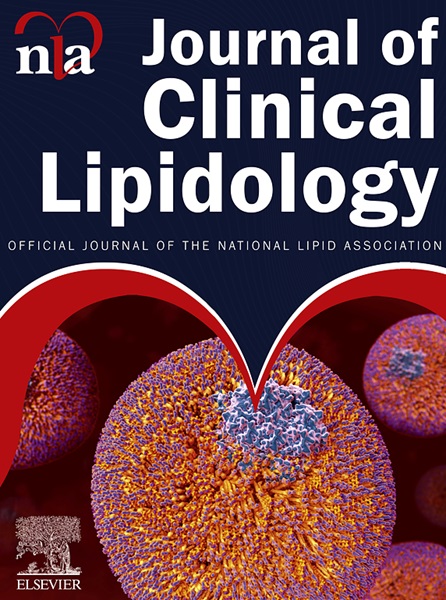Impact of PCSK9 monoclonal antibody inhibitors on Lp(a) reduction in African Americans with elevated Lp(a)
IF 3.6
3区 医学
Q2 PHARMACOLOGY & PHARMACY
引用次数: 0
Abstract
Background/Synopsis
Elevated Lipoprotein(a) [Lp(a)] levels are associated with a higher risk of atherosclerotic cardiovascular disease (ASCVD) such as myocardial infarction, ischemic stroke, coronary artery disease, and aortic stenosis, notably in the African American population. Proprotein convertase subtilisin/kexin type 9 monoclonal antibody inhibitors [PCSK9mab] have been shown to reduce Lp(a) by a small percentage. The FOURIER Trial demonstrated that evolocumab reduced Lp(a) by 6.2% to 46.7% with a median reduction of 26.9%. Other studies reported similar reductions, with a mean decrease of 20 to 25%. African Americans tend to have higher baseline Lp(a) and there are a limited number of studies highlighting the Lp(a) reduction in this population.
Objective/Purpose
To assess the effects of PCSK9mab inhibitor on Lp(a) in the African American population with elevated baseline Lp(a)
Methods
Single center, retrospective review of electronic medical record for all patients prescribed PCSK9mab inhibitor with baseline Lp(a) levels from January 1, 2023 to December 31, 2024. Chart review was used to further identify patients who had serial Lp(a) measurements. For the purposes of this study, Lp(a) levels were measured in nmol/L, with elevated Lp(a) defined as > 125 nmol/L.
Results
A total of 50 patients were analyzed. The average age was 59.2 years old. 54% (n=27) of patients were female, 92% (n=46) of patients were secondary prevention patients. 92% (n=46) patients were Black. Average baseline LDL was 129 mg/dL. The highest Lp(a) > 600 nmol/L. 10 patients had serial Lp(a). All 10 of the patients with serial Lp(a) were African American. The median Lp(a) decrease was 41.2%. The mean Lp(a) decrease was 38%.
Conclusions
While previous studies have demonstrated that PCSK9mab inhibitors decrease Lp(a) levels by a median of 26.9% and a mean of 20 to 25%. The results of this evaluation showed a greater reduction in median and mean Lp(a) levels compared to prior studies. They also suggest futher evaluation is warranted to determine if there is a real-world racial difference in Lp(a) reduction.
PCSK9单克隆抗体抑制剂对Lp(a)升高的非裔美国人Lp(a)减少的影响
背景/摘要脂蛋白(a) [Lp(a)]水平升高与动脉粥样硬化性心血管疾病(ASCVD)(如心肌梗死、缺血性卒中、冠状动脉疾病和主动脉狭窄)的高风险相关,尤其是在非裔美国人人群中。蛋白转化酶subtilisin/kexin 9型单克隆抗体抑制剂(PCSK9mab)已被证明可以降低Lp(a)的百分比。FOURIER试验表明,evolocumab将Lp(a)降低6.2%至46.7%,中位降低26.9%。其他研究报告了类似的减少,平均减少20%至25%。非裔美国人往往有较高的基线Lp(a),并且有有限数量的研究强调Lp(a)在该人群中的降低。目的/目的评估PCSK9mab抑制剂对基线Lp(a)升高的非裔美国人群Lp(a)的影响。方法单中心回顾性分析2023年1月1日至2024年12月31日所有处方PCSK9mab抑制剂且基线Lp(a)水平的患者的电子病历。使用图表回顾进一步确定有连续Lp(a)测量的患者。为了本研究的目的,以nmol/L为单位测量Lp(a)水平,升高的Lp(a)定义为>;125 nmol / L。结果共分析50例患者。平均年龄为59.2岁。女性患者占54% (n=27),二级预防患者占92% (n=46)。92% (n=46)患者为黑人。平均基线LDL为129 mg/dL。最高Lp(a) >;600 nmol / L。10例患者连续Lp(a)。所有10例序列Lp(a)患者均为非洲裔美国人。中位Lp(a)下降41.2%。Lp(a)平均下降38%。先前的研究表明,PCSK9mab抑制剂降低Lp(a)水平的中位数为26.9%,平均为20%至25%。该评估结果显示,与先前的研究相比,中位和平均Lp(a)水平有更大的降低。他们还建议有必要进一步评估,以确定在Lp(a)减少方面是否存在现实世界中的种族差异。
本文章由计算机程序翻译,如有差异,请以英文原文为准。
求助全文
约1分钟内获得全文
求助全文
来源期刊
CiteScore
7.00
自引率
6.80%
发文量
209
审稿时长
49 days
期刊介绍:
Because the scope of clinical lipidology is broad, the topics addressed by the Journal are equally diverse. Typical articles explore lipidology as it is practiced in the treatment setting, recent developments in pharmacological research, reports of treatment and trials, case studies, the impact of lifestyle modification, and similar academic material of interest to the practitioner.
Sections of Journal of clinical lipidology will address pioneering studies and the clinicians who conduct them, case studies, ethical standards and conduct, professional guidance such as ATP and NCEP, editorial commentary, letters from readers, National Lipid Association (NLA) news and upcoming event information, as well as abstracts from the NLA annual scientific sessions and the scientific forums held by its chapters, when appropriate.

 求助内容:
求助内容: 应助结果提醒方式:
应助结果提醒方式:


